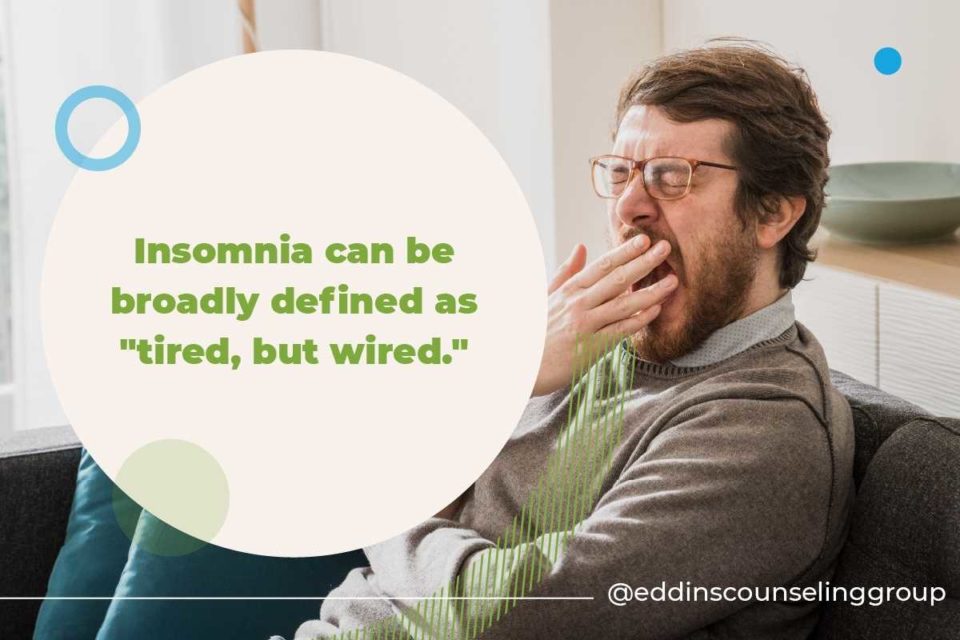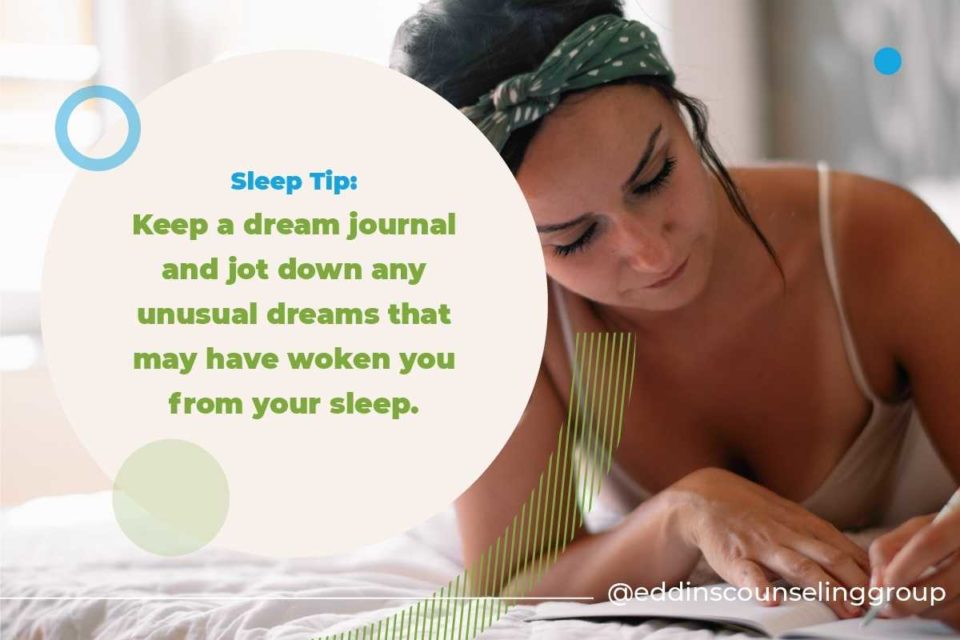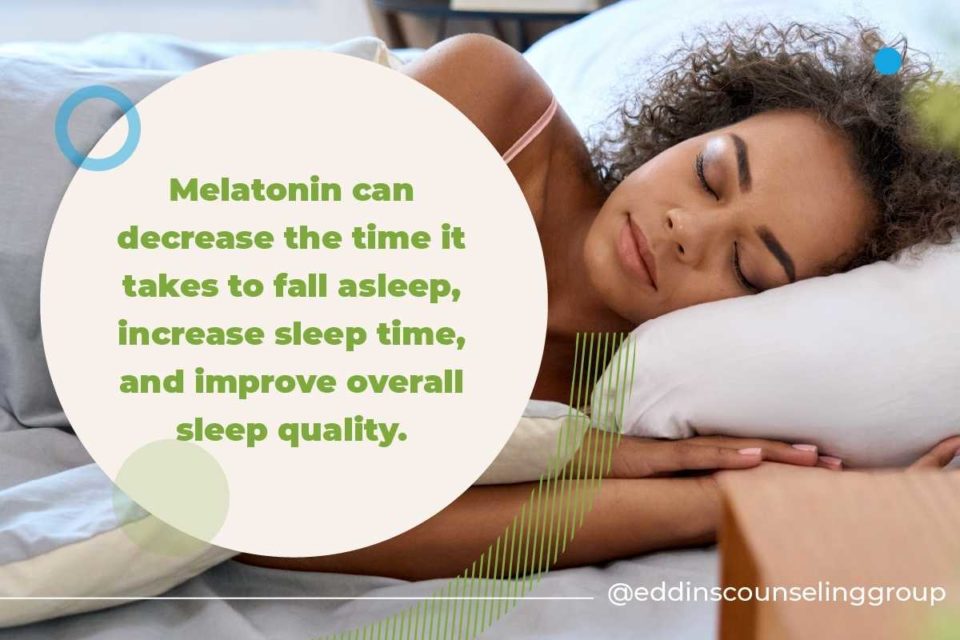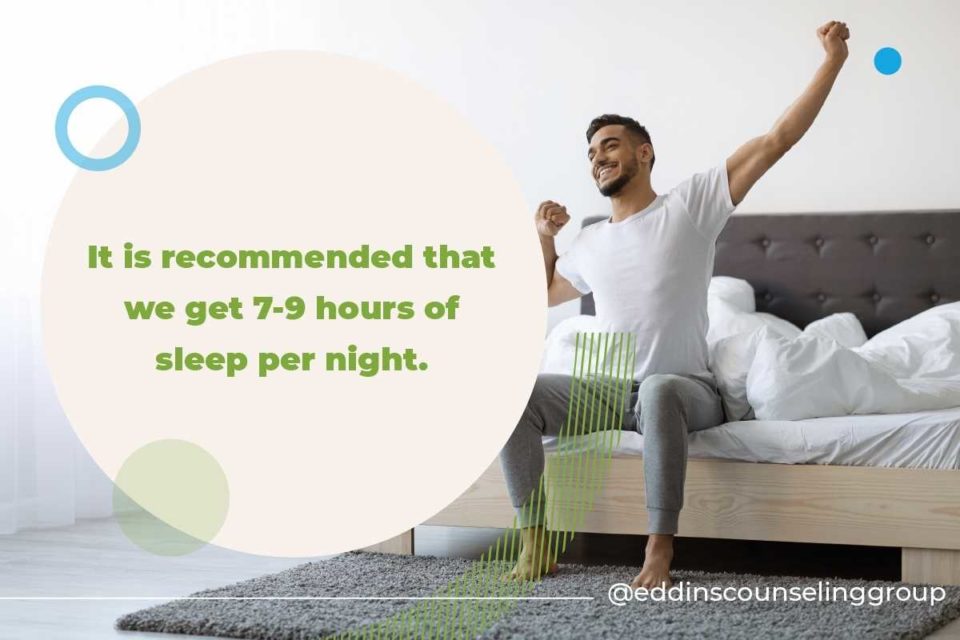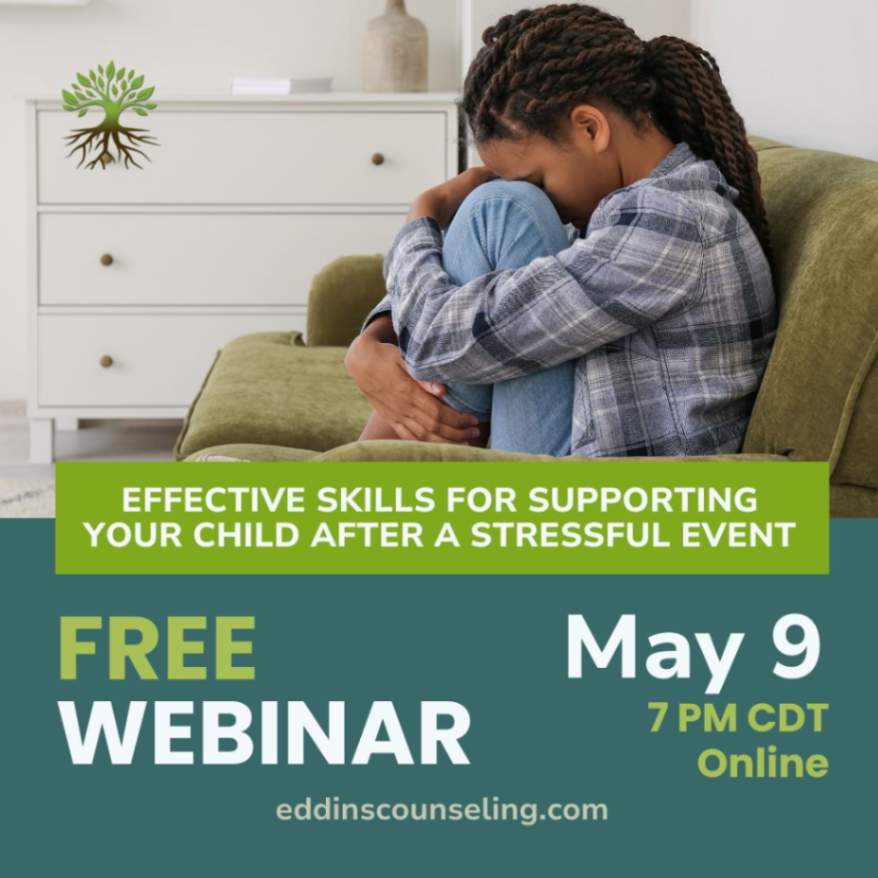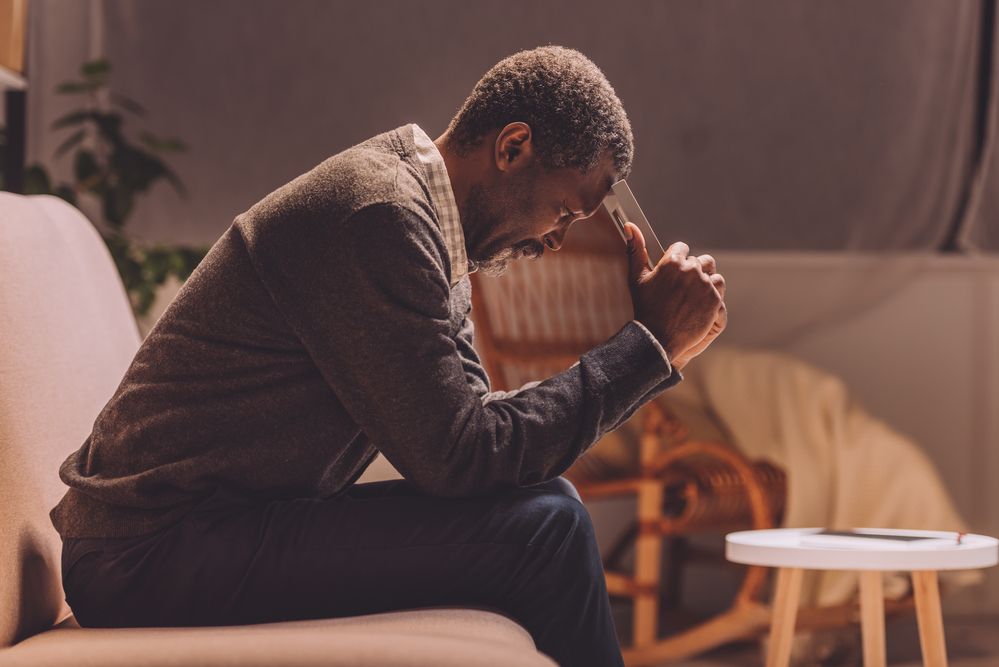January 29, 2022
Do You Have Insomnia? Learn How to Sleep Better and Improve Your Mood
Written by Rachel Eddins
Posted in Emotional & Mental Health, Tools & Exercises and with tags: Anxiety, depression, insomnia
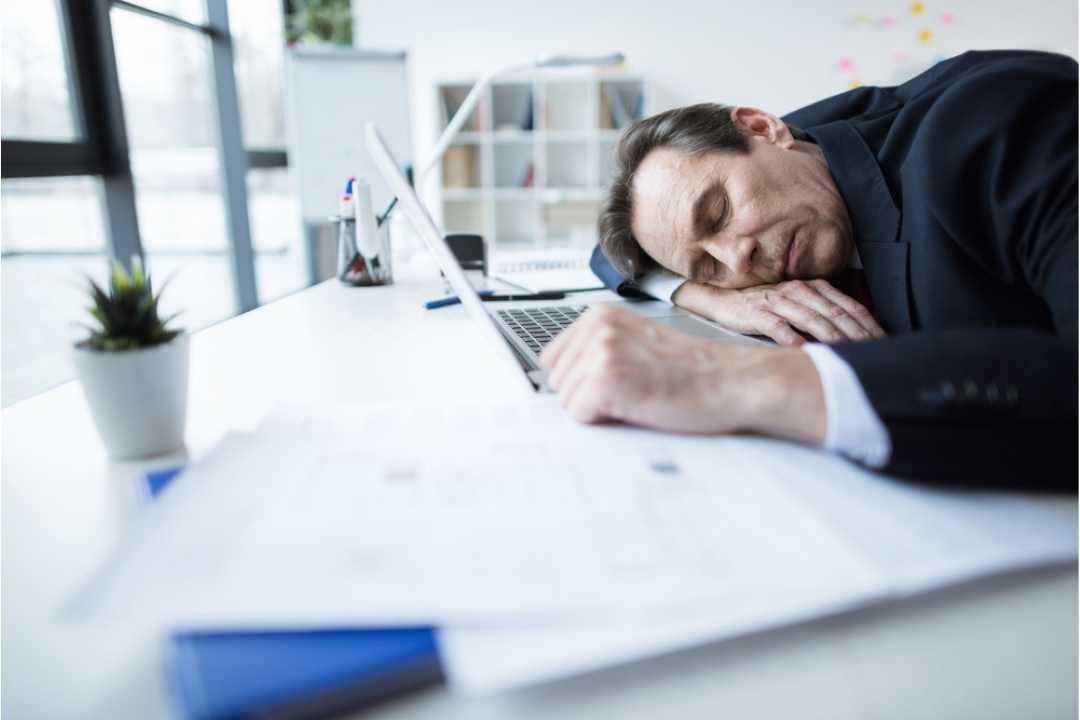
You toss and you turn, yet nothing. No matter how long you stare at the ceiling, sleep evades you. What can you do when you have trouble sleeping?
Insomnia affects about 60 million Americans each year, especially women and the elderly (over the age of 65).
There are three general types of sleep disturbance:
- onset insomnia – difficulty falling asleep,
- terminal insomnia – waking up too early, usually an hour, or
- middle insomnia – frequent awakening throughout the night.
Sleep disturbance goes hand in hand with depression and anxiety. Sometimes depression or anxiety trigger sleep disturbance and sometimes, it’s the other way around.
Difficulty falling asleep is often related to anxiety while difficulty staying asleep/early awakening is often related to depression. Physiological changes, lifestyle changes, or general life stressors can also contribute to insomnia.
Try and identify what may be contributing to your pattern of sleep disturbance and seek help or support if necessary.
Keep reading if you want to learn how to sleep better.
Give Yourself the Best Chance at a Good Night’s Rest
Insomnia can be broadly defined as “tired, but wired.” If you find that you are falling asleep during the day and can’t keep your eyes open or head up, you may have a medical condition other than insomnia.
Talk to your doctor or schedule a sleep study. If however, you feel tired, but just can’t get the sleep you need, it’s likely you’re struggling with insomnia.
Once you have experienced insomnia, your brain no longer associates the bed with just sleep, it also associates the bed with the anxiety and frustration of insomnia. Pairing the bed with other activities further reduces the bed-sleep association, increasing sleep problems.
Implementing the following strategies will help train your brain to activate the sleep drive when you hit the hay.
The next time you find yourself unable to catch a wink, give some of the following sleep strategies a try:
What Causes Insomnia?
There are three sleep patterns that can cause insomnia:
- Decreased sleep drive: this is your deep sleep function. We need to build up our sleep drive throughout the day in order to rest well at night.
- Dysregulated body clock or circadian rhythm. Your body clock dictates the amount of time you sleep. Regulating your body’s clock can decrease insomnia.
- Worry and anxiety can keep you up at night. Whether you have situational worries or struggle with anxiety, it can lead to insomnia. Insomnia can also increase anxiety about sleep resulting in increased insomnia.
- Depression.
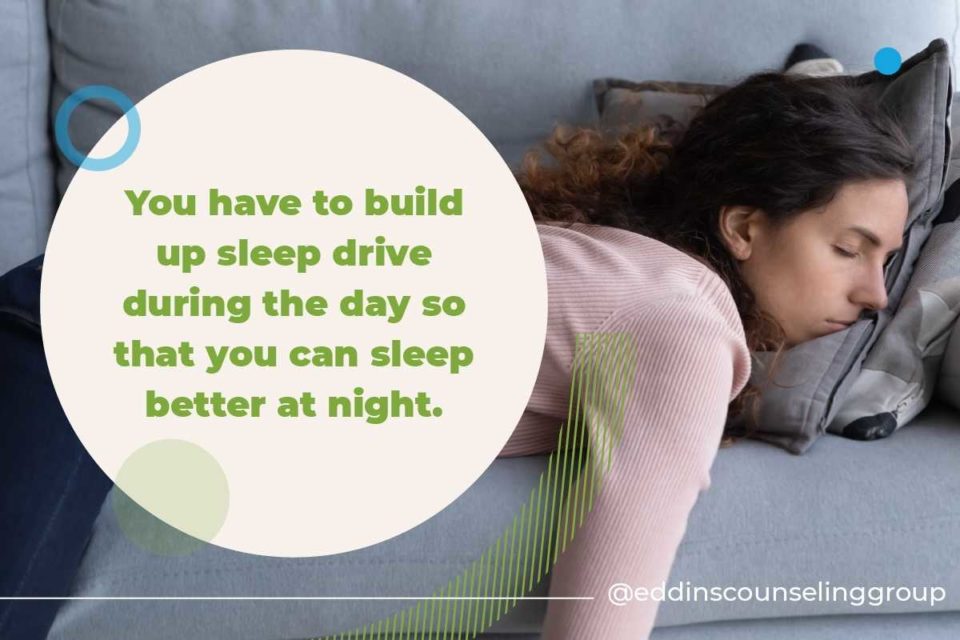
Increasing Your Sleep Drive Helps you Fall Asleep and Stay Asleep
Your sleep drive is your deep sleep function. You have to build up sleep drive during the day so that you can sleep better at night. When you build up sleep drive, you fall asleep at night easily and stay asleep.
Deep sleep is good quality sleep (generally from 10 pm – 2 am). After deep sleep, your body clock takes over for the rest of the night.
If you aren’t tired enough, however, your body won’t have the energy to stay asleep throughout the night.
- Do not go to bed too early. Your body normally lets you sleep only the number of hours its needs. If you are going to bed early, ask yourself why (bored, depressed, stress). You need to build up sleep drive in order to sleep through the night without waking.
- Avoid arousing activities before bedtime: exercising, watching a scary movie, working, surfing the net, etc.
- Turn off electronics – digital devices stimulate our brain. Unplug from screens at least 30 minutes before bed. The screens release a blue light that prevents our brain from preparing for sleep.
- Avoid taking naps in the middle of the day. This will only make it harder to get to sleep when you really want to. If you really have to take a nap to get through the day, keep it to about 20 minutes so that you aren’t groggy after your nap. Napping can also reduce slow-wave sleep at night. Once you no longer have insomnia it’s fine to take a nap occasionally.
- Avoid “sleeping in.” This will make it harder to go to sleep at a regular time that evening.
- Keep a regular sleep schedule. If you go to bed at the same time every day your body will start to pick up on it and prepare itself for sleep when the time comes. Of course, keeping a regular sleep schedule also means waking up at the same time every day, so don’t hit the snooze button 4 times in the morning. Try to wake up at the same time on weekdays as you do on the weekends. Catching up on sleep on the weekends can weaken the sleep drive and lead to early morning awakening. By waking up at the same time each morning, you will find the quality and quality of your sleep improving. Once you’ve established a healthy pattern of sleep occasional sleeping in an extra hour or two won’t throw off your body clock.
- Reduce long periods of time in bed. This will decrease your sleep drive and make falling or staying asleep more difficult at night.
- Avoid caffeine afternoon. Stimulants like caffeine and nicotine strongly suppress sleep drive. Caffeine has a half-life in the body of four hours. So if you have a strong cup of coffee (200mg) at noon, you have 100mg in your body at 4pm and 100mg at 8 pm. By midnight you still have 25 mg, enough to disrupt your sleep.
- Avoid alcohol before bed. Don’t drink alcohol within a few hours of bedtime. Alcohol may increase drowsiness if you have onset insomnia but it has a rebound effect with frequent awakenings and poor quality sleep throughout the night.
- Only go to bed when you are ready to sleep. If you aren’t sleepy, do something that will help you relax. An example would be reading a book, taking a warm bath/shower or meditating.
- Do some aerobic exercises during the day, but avoid doing so within a few hours of bedtime. Physical movement (especially outdoors) can promote restful sleep at night.
- Stretch/read/de-stress before bed – yoga poses, reading, or meditation help calm and relax the muscles and body.
Regulating Your Body’s Clock Impacts How Long You Sleep
Your body clock, or circadian rhythm, regulates how long you sleep. In addition to building up your sleep drive, you want to regulate your body’s clock.
- Shift work can disrupt circadian rhythms, leading to many of the same effects as poor/short sleep. Use pre-sleep rituals to alleviate some of the effects of shift work.
- Get outside in the sunlight and fresh air during the day. Exposing yourself to sunlight during the day can regulate your circadian rhythm.
- Eat appropriately – eat consistently during the day to regulate your body’s clock. A regular to smallish sized meal 2-3 hours before bedtime can help facilitate sleep.
- Turn down your thermostat at night. A mild drop in temperature helps increase our sleep drive (our ancestors used to sleep outside). Try lowering your thermostat 5 degrees an hour before bedtime.
- Go to bed before midnight – this is better aligned with natural light cycles.
- Take a warm shower or hot bath before bed. Not only is this a healthy thing to do, insomnia or not, but it will help relax you both physically and mentally.
- Make sure your bedroom is as dark as you can make it. If lights from the city come in through the windows, put up shades, curtains, or blackout curtains.
- Avoid bright light at night. A well-lit room is still about as bright as the clear sky at sunset. Indoor lighting can trick the brain into thinking it’s not nighttime yet, even if it’s been dark outside for hours. This can interfere with sleep because the brain won’t allow your sleep drive to kick into high gear until it thinks the sun has been down for at least an hour or so. Turn off all lights about an hour before bedtime and use a dim lamp from that point on. Watch out for your computer screen too because at close range its monitor is bright enough to simulate twilight. A TV is usually ok if it is across the room with the other lights out.
- Reduce the light to low level in the evening 2 hours before bed.
- Develop rituals that signal the end of the day. Turning out the lights, practicing breathing exercises, having a cup of calming tea, reading a book, taking a warm bath, etc.
- Go to sleep before you have a “second wind.”
Managing Your Worries Helps You Stay Asleep
- Process troubling thoughts/feelings before bed. Talk things through with a trusted confident. Journal or write down thoughts and feelings and leave them behind for the night.
- Write out the next day’s to-do list before you go to bed. This way items aren’t swirling in your mind.
- Avoid taking your problems to bed with you. For many people the prime time to dwell on negative thoughts is when they are lying in bed trying to fall asleep. This revs up the brain’s stress response circuits making it impossible to fall asleep. Shift your attention to another activity instead. Try:
- Replaying scenes from a favorite movie in your head. Watch a relaxing movie before bed and reflect back on the scenes in your head. Visualize a relaxing scene. Choose a favorite vacation spot or pleasant memory.
- Use progressive muscle relaxation. This technique involves tightening and then relaxing each major muscle group in the body.
- Practice deep breathing or 3-part breathing.
- Practice mindful meditation. There are numerous guided meditations available online, particularly for sleep. Use an app or search online for ‘sleep meditation’.
- If you are worrying in bed, get up and go to another room until you feel sleepy.
- Set aside time earlier in the evening to worry. Make a list. Consider what is troubling you, then decide on your next immediate step to solve this problem.
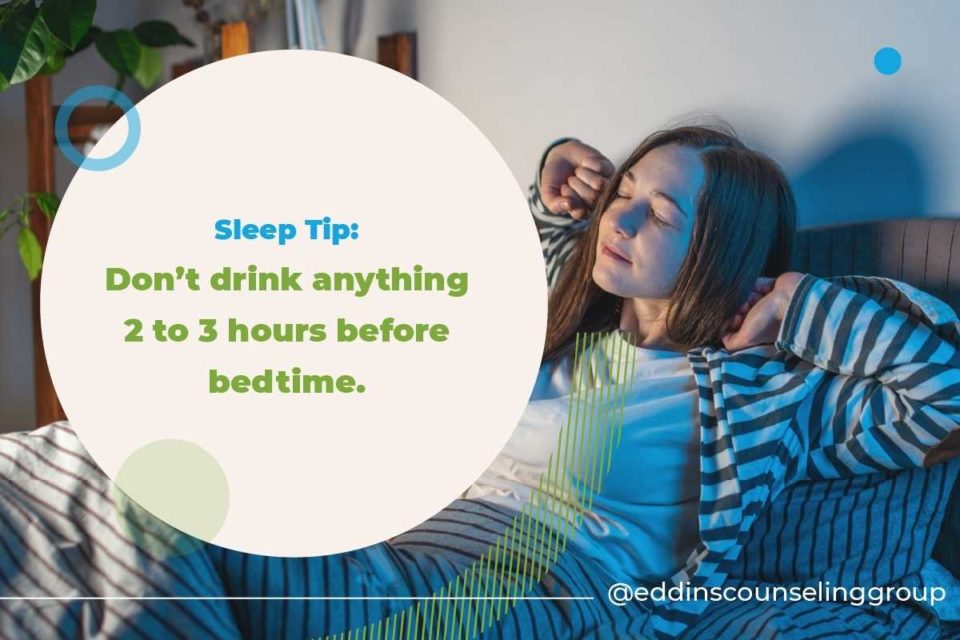
Learn How to Reduce “Conditioned Arousal”
When you struggle with insomnia, your brain can learn to associate bedtime with wakefulness.
It’s as if a switch turns on when you get in bed. No fun!
This is referred to as conditioned arousal.
Your brain has been conditioned to be alert.
Here are some strategies to combat conditioned arousal:
- Avoid sleeping anywhere other than your own bed. Pairing sleep with the sofa, guest room, comfy chair, interferes with the process of programming the sleep reflex to occur in your bed.
- Use the bed only for sleeping and sex and get into bed when drowsy. This helps condition the body to fall asleep in bed and stay asleep. Anytime you are lying awake for more than 15 minutes, get up and do a relaxing activity in another room until you are drowsy.
- Do not TRY to fall asleep. This will just make you frustrated. Get out of bed if you’re unable to fall asleep after 15-20 minutes and do a relaxing activity until you are sleepy again.
- Focus on doing stimulating activities such as talking on the phone, watching TV, working on the computer, in another room. These activities will stimulate you making it more difficult to wind down and sleep restfully.
- Do activities to make you drowsy in another room. This helps condition your body to associate the bedroom with sleep.
- Have a stress-free/clutter-free bedroom –get rid of stacks of things lying around.
- Keep all of your clocks out of sight. Watching the clock will make getting to sleep even harder the longer the night goes on. Especially as you start to worry about getting enough sleep before it is time to wake up.
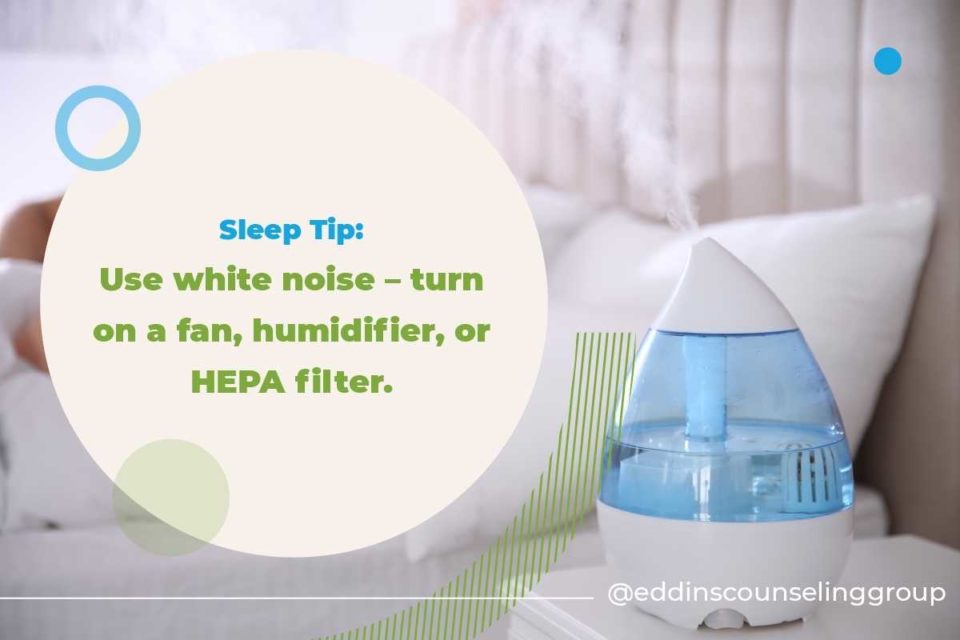
Other Sleep Tips to Relax & Get a Good Night’s Rest
- Keep a dream journal and jot down any unusual dreams that may have woken you from your sleep. Try and identify any conflicts or emotional issues that you may need to address during waking hours. Talk to your counselor for help.
- Don’t drink anything two to three hours before bedtime. This may cause trips to the bathroom in the middle of the night that can interrupt your sleep. Once you interrupt your sleep you may not be able to fall right back to sleep.
- Do some gentle yoga close to bedtime to help relax your muscles and soothe your nervous system. There are numerous videos online that you can use and many are short segments. Search for restorative yoga, yoga for sleep. You don’t have to do a yoga routine, several yoga poses can help relax your nervous system and prepare your body for sleep.
- Legs up the wall pose: This yoga pose can be very helpful in relaxing your body’s nervous system for sleep. Lay your hips, back, shoulders and head down on the floor and prop your legs up to the wall (search online for “legs up the wall yoga”). Make the pose as comfortable as possible by placing a blanket/bolster under the hips/low back and a small pillow under the head. You may also want to place a blanket on top of you as you may get cold practicing this pose. If legs up the wall is too intense, consider bending the knees and resting your calves and heels on a chair. Comfortably rest in this pose for 10-15 minutes.
- Use white or brown noise – turn on a fan, humidifier, or HEPA filter.
- Try diffusing calming essential oils such as lavender (or relaxing scents you love) at bedtime to relax you. Focusing on your senses can help keep your mind from wandering.
- Try a music program designed to induce slow-wave sleep patterns such as brain.fm.
Supplements that Can Help with Insomnia & Medications that Can Interfere with Sleep
- Take a magnesium supplement if you have difficulty falling asleep.
- Ashwagandha (Withania somnifera): an Ayurvedic herb to help recover from stress and insomnia, restore libido, increase energy and stamina, normalize cortisol levels
- Remedy any vitamin deficiencies. Your medical professional can help you check for this. Low levels of vitamin D3, B vitamins, potassium, zinc, and calcium can all impact sleep. Take a multi-vitamin and B-complex vitamin daily to ensure you aren’t deficient.
- Benzodiazepines (Ativan, Valium, Klonopin) may reduce restorative slow-wave sleep. They may help you fall asleep or increase how long you sleep, but you may not get the quality deep sleep that is needed to feel rested.
- Melatonin can decrease the time it takes to fall asleep, increase sleep time, and improve overall sleep quality. However, prolonged use of melatonin could impact thyroid functioning. Talk to your doctor to find out more.
- Avoid sleeping pills if you can. Sleeping pills will help with the process, but they are not always successful since, unfortunately, science has yet to find a cure for insomnia. Keep in mind with sleeping pills that they can lead to rebound insomnia on nights the medication isn’t used.
- Medication side effects, sleep disorders (i.e., sleep apnea, limb movement disorder), and other medical conditions (i.e., chronic pain, hyperthyroidism) can also contribute to sleep disturbances. If you find yourself falling asleep during the day, it is more likely related to sleep apnea than it is insomnia. A sleep study can help you confirm this.
If you have a Fitbit, Oura, Apple Watch, or similar device you can track your sleep and experiment with seeing how different interventions help.
Overall, you want to have a combination of REM sleep, deep sleep, and light sleep totaling 7-9 hours per night.
Further, your heart rate should lower mid-way through the night to allow your body to recover and rejuvenate.
Seek Professional Help if You Have Trouble Sleeping
It is recommended that we get 7-9 hours of sleep per night. Ensuring that you have proper sleep is an essential part of self-care and can help in both physical and emotional disease prevention.
Sleep hygiene is an important element to balance as you focus on your health. Poor-quality and short-duration sleep can cause or exacerbate many metabolic and other physiological problems.
Sleep hygiene and pre-bed sleep rituals help increase the quality and length of sleep at night.
Unfortunately, there isn’t one cure that works for all the different types of insomnia. But you should give some of these strategies a try and see if your sleep starts to become more regular.
Learning how to sleep better takes regular practice. If you continue to experience sleep disturbances after putting these steps into practice talk to a professional to rule out other medical conditions.
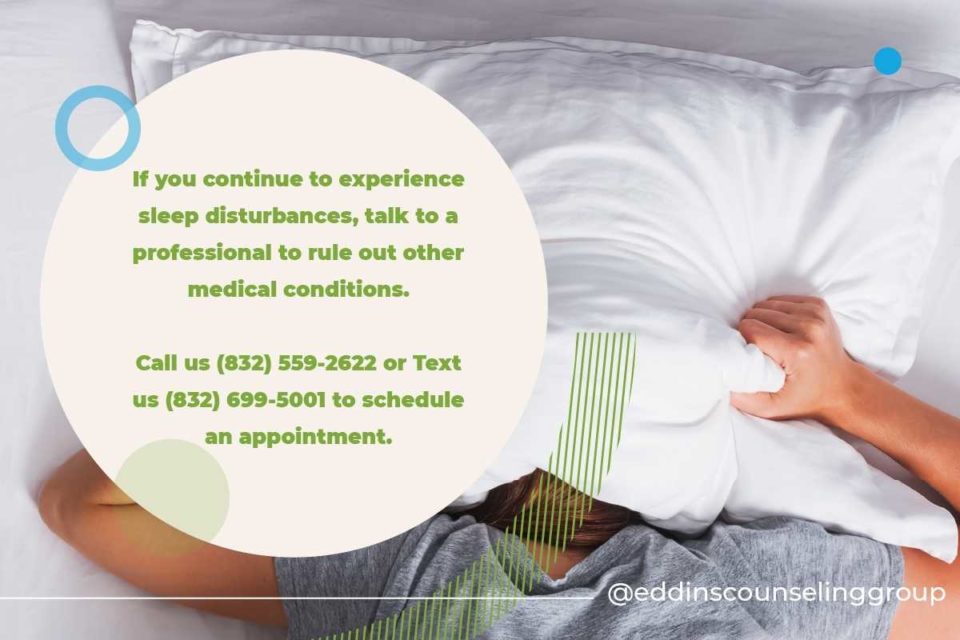
Cognitive Behavioral Therapy for Insomnia
Our therapists at Eddins Counseling Group specialize in cognitive behavioral therapy for insomnia. CBT-I is the most effective form of insomnia treatment outside of medication. You may also want to talk to a sleep therapist as anxiety or depression could be keeping you awake at night.
Get started with our Montrose therapists today. In Houston Heights or Sugar Land? We can see you there, too!
Read more about anxiety treatment.
Read more about depression treatment.
We would love to help you overcome insomnia, get healthy sleep and be your best you again.
Grounding & Self Soothing
Get instant access to your free ebook.
Why You Feel This Way
Get instant access to your free ebook.

